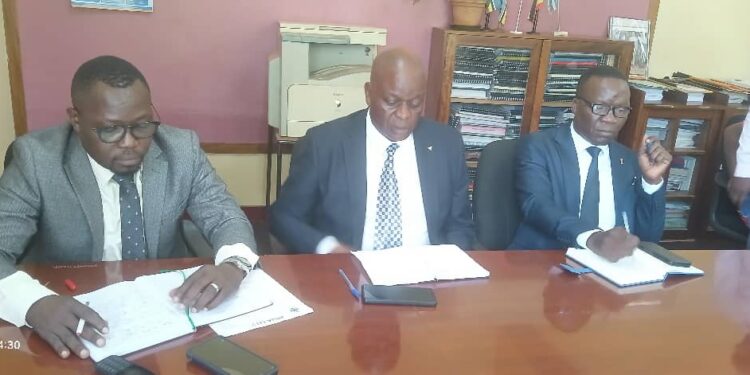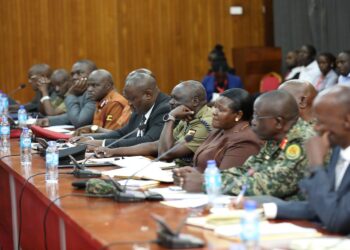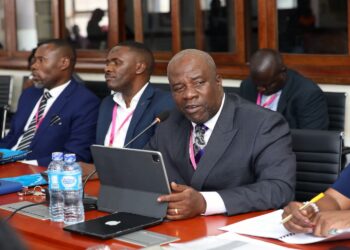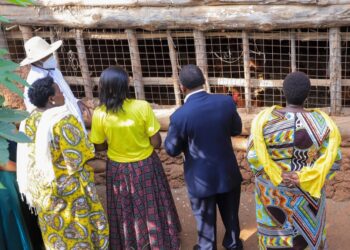A contentious issue involving the sale of a property housing medical workers of Jinja Regional Referral Hospital (JRHH) has been resolved, thanks to the intervention of city leaders.
The 1950s-era property with its crumbling façade and whose rusty roof seemed to sag under the weight of years, located on Plot 47 School Lane, has been at the center of a heated debate after an eviction notice was issued to the health workers.
Jinja City leaders, including Jinja RCC Richard Gulume Balyainho, Mayor Alton Peter Kasolo Okocha, Speaker Bernard Mbayo, Town Clerk Edward Lwanga, Land Board Secretary Abubaker Kirunda Menya, and JRHH Management Board chairman Dr. David Charles Mukisa unanimously agreed that the health workers should continue occupying the property.
The meeting resolved to instruct Abubaker Kirunda Menya to retract the eviction notice, which was seen as a threat to service delivery.
According to Gulume Balyainho, the decision was made to avoid triggering a protest from the hospital staff, which could have resulted in the loss of lives.
The city leaders also plan to conduct an audit to establish the circumstances surrounding the attempted sale and identify those involved.
Edward Lwanga clarified that the incident was an isolated mistake and not a result of disjointed operations within the Jinja City Council.
The town clerk, who sat confidently at the news conference, dressed impeccably in a navy-blue jacket and matching tie, summed it, saying the situation is under control.
His professional demeanour commanded attention, and his articulate responses to questions demonstrated his expertise in his role.
The resolution brings relief to the medical workers and the community, ensuring uninterrupted healthcare services.
The hospital, which was established in the 1930s as a health unit for World War II combatants and prisoners of war, provides critical healthcare services to the region and neighbouring districts of Buikwe and Kayunga.
Documents reveal that the building was sold to an elderly Bachu Abudarah Aziz of Iganga in 2001 for 80,000,000 Uganda shillings.
However, the authenticity of these documents can not be guaranteed.
Reports say Bachu Aziz has been trying to take possession of the property for many years but has faced numerous challenges.
The situation has been further complicated by the fact that the building is currently occupied by medical workers from the JRHH.
The city leaders’ resolution has brought temporary relief, but the long-term fate of the property remains uncertain.
However, a source at the Jinja City Land Board has expressed concerns that the controversy surrounding the housing of medical workers at Jinja Regional Referral Hospital (JRHH) cannot be resolved by mere pronouncements, citing legal implications for the parties involved.
The source, who preferred to remain anonymous for fear of reprisal from politicians, warned that the property owner could take legal action against the Jinja City Council, potentially resulting in costly compensation and damages.
“…Mere pronouncements cannot wish away the legal implications of this matter,” the source said, adding “…At an appropriate time, the property owner can take the legal path, and this could cost the Jinja City Council billions of taxpayers’ money in compensation and damages…”
The source’s concerns highlight the complexity of the issue and the potential consequences of not addressing the underlying legal concerns.
The Jinja City Council’s decision to allow the health workers to continue occupying the property may have provided temporary relief, but it may not have fully resolved the matter. According to insiders familiar with government operations, the building will remain under the hospital’s control.
They argue that the best course of action is for the Land Board and city authorities to collaborate and facilitate the legal acquisition of the property, complete with all necessary documents.
Richard Gulume has echoed this sentiment, stating that anyone who thinks the building will be privatized is mistaken. Gulume emphasized that the regional hospital is in dire need of more buildings to accommodate its staff, implying that the property’s fate is all but sealed.
The hospital itself has been undergoing significant developments, including the commissioning of a new 64-bed orthopaedic ward funded by the Samuel Leeds Foundation.
With the hospital’s growing needs and the government’s commitment to prioritizing public interests, it seems unlikely that the building will be transferred to private hands.
As the controversy surrounding the housing of medical workers at Jinja Regional Referral Hospital (JRHH) appears to settle, the media has been cautioned to exercise sensitivity in their reporting.
City leaders urged the media to avoid sensationalizing the issue. They warned that such an approach could cause unnecessary anxiety and incite members of the public.
“…We urge the media to report on this issue in a responsible and sensitive manner, we must avoid causing unnecessary anxiety and panic among the public, and instead focus on providing accurate and balanced information…”, said Richard Gulume Balyainho, Jinja RCC.
The media was also reminded of the importance of verifying information before publishing to avoid spreading misinformation and fueling speculation.
“…We appreciate the role of the media in keeping the public informed, but we must do so in a way that promotes understanding and calm, rather than sensationalism and panic…,” added Edward Lwanga, Town Clerk.
The controversy surrounding the JRHH housing has been a major concern for the community, and the media’s role in reporting on the issue will be crucial in shaping public opinion and promoting a peaceful resolution.
In conclusion, the health workers residing in the building can now breathe a sigh of relief, thanks to the assurances made by city officials.
The pronouncements by the city leaders have provided a sense of security and stability, allowing the health workers to focus on their critical work without worrying about their living arrangements.
With the city officials vowing to prioritize the interests of the hospital and its staff, it appears that the controversy has been laid to rest.
The resolution of this issue is a testament to the city leaders’ commitment to ensuring the well-being of the health workers and the community they serve.
As the dust settles on this issue, the people of Jinja can rest assured that their health workers will continue to provide essential services without any disruptions.
Do you have a story in your community or an opinion to share with us: Email us at editorial@watchdoguganda.com













